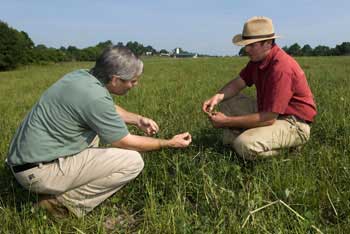Forage conference will educate producers about drought-proofing pastures

Virginia Cooperative Extension and the Virginia Forage and Grassland Council are hoping to provide livestock producers with key strategies to help them drought-proof their farms to reduce the effects of future droughts at this year’s forage conference to be held Jan. 21-24.
The conference will be offered on Monday, Jan. 21, at Mrs. Rowe’s Country Buffet, Mt. Crawford, Va.; Tuesday, Jan. 22, at at the Southwest Virginia 4-H Center in Abingdon, Va.; and Thursday, Jan. 24, at the Southern Piedmont Agricultural Research and Extension Center, Blackstone, Va. Registration will begin at 8:30 a.m., and events will end at 3:30 p.m.
This conference will also be held in cooperation with the North Carolina Forage and Grassland Council and North Carolina Cooperative Extension on Wednesday, Jan. 23, at the Southern Livestock Center near Oxford, N.C. Registration for this location will begin at 12:30 p.m. and events will end at 7:00 p.m. For more information on this location, please contact Sue Ellen Johnson at (919) 513-1335.
"Farmers are faced with continuing problems as a result of the drought. This conference is designed to help farmers look beyond the short-term problems and learn key management strategies and practices to begin drought proofing their farm's forage and grazing systems, with the long-term goal of reducing the financial impact of future droughts," said Gordon Groover, Extension farm business management specialist at Virginia Tech.
Presenters at the conference will provide information on a wide range of topics including pasture management, forage selection, stocking rates, designing and implementing watering systems, fencing, and how to use alternative forages, crop residues, and byproducts in drought management strategies.
- Sue Ellen Johnson, assistant professor of crop science at North Carolina State University and Chris Teutsch, associate professor of crop and soil environmental sciences at Virginia Tech’s Southern Piedmont Agricultural Research and Extension Center, will unravel the mystery of how to manage pastures for maximum drought tolerance.
- Ben Tracy, an associate professor of crop and soil environmental sciences at Virginia Tech, will use his knowledge and experience in grassland ecosystem management to help farmers understand how to select forage species that will enhance the robustness of their grazing systems.
- Ed Rayburn, an Extension forage specialist with the West Virginia Cooperative Extension Service, will provide practical knowledge from his years of research experience to help farmers manage their risk by getting their "stocking rates right."
- NRCS specialists with local experience and knowledge will help farmers understand how to cost effectively design and implement livestock watering systems to improve utilization of available forages.
- Lewis Sapp, of Salem, N.C., has more than 25 years in design and implementation of livestock fencing systems and he will give a presentation on cost-effective fencing.
- Matt Poore, Extension livestock nutritionist with North Carolina Extension Service, will explain how conserved forages, crop residues, and byproducts can be incorporated into a farm's drought management strategies.
- Mac Baldwin, who farms with his son and grandsons near Yanceyville, N.C., will share his experience with grazing systems that include annual ryegrass and crabgrass for their cow-calf, stocker and grass-finished beef enterprises.
The Virginia Department of Conservation and Recreation supports the conference. The early registration fee (postmarked two weeks prior to the event) is $25 for Virginia Forage and Grassland Council members and $40 for non-members. After the deadline for early registration, the fee is $35 for Virginia Forage and Grassland Council members and $50 for non-members.
For more information or to register for the conference, contact Chris Teutsch at (434) 292-5331.
Virginia Cooperative Extension brings the resources of Virginia’s land-grant universities, Virginia Tech and Virginia State University, to the people of the commonwealth. Through a system of on-campus specialists and locally based agents, it delivers education in the areas of agriculture and natural resources, family and consumer sciences, community viability, and 4-H youth development. With a network of faculty at two universities, 107 county and city offices, 13 agricultural research and extension centers, and six 4-H educational centers, Virginia Cooperative Extension provides solutions to the problems facing Virginians today.




